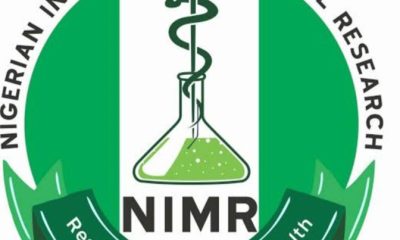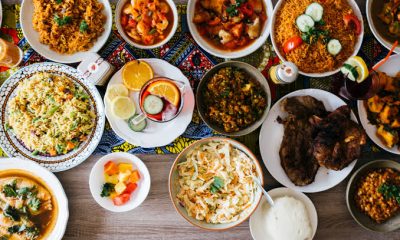EKO NEWS
Food Security: Tackling Food Scarcity in Lagos

-
it’s no longer news that the population of Lagos keep increasing on a daily basis and the task of producing enough food to meet the demand of the growing population through various agricultural researches and technologies is enormous.
According to reports from the state government, residents of the state consume food and agricultural produce worth about N5 trillion annually, and if the population is to grow to about 30 million by 2030, Lagos will likely need food worth N6.3 trillion on an annual basis.
Dr Olalekan Pereira Sheteolu, programme manager and CEO Lagos State Agricultural Development Authority (LSADA), disclosed this in an exclusive interview with EKO HOT BLOG in his office at Oko-Oba Agege.
Sheteolu said that Lagos being the 5th largest economy in Africa and is ensuring food security under the administration of Mr Babajide Olushola Sanwo Olu.
Periera-Sheteolu noted that agriculture came up as an aim to make Lagos a 21st-century economy, adding that the present administration has been working so hard to meet up with the set themes agenda for a greater Lagos.
See Full Video Below:
Read Also: Southwest ATPN Drums Support For Odun Omo Iganmode
“If Lagos had existed as a country, it would be the fifth-largest economy in Africa, and talking about food security, ever since the inception of this administration, the first thing they did was to delve into the various part of the state’s economy and came up with a six agenda,” he said.
According to him, the present administration’s agenda has six pillars of which agriculture is one of them, which focus is on feeding the residents.
He said, “everything we do has been solely built on this administration’s THEMES agenda. Agriculture came up with the M which is making Lagos a 21st-century economy and basically, it means anything you need to do, without people being well-fed and having enough food and they are able to move from one place to another, then it’s not worth it.
“To make Lagos State food secured, the present administration is actually doing a lot. Looking back to the cost of rice three-four years ago, and considering that it was getting out of the reach of the common man, we decided to collaborate with Kebbi State and came up with LAKE Rice. Note that to make up that name; LA was for Lagos and KE for Kebbi. This collaboration really reduced the price of rice to about 12-15 thousand naira.

“The local farmers across the country now produce rice as we have more rice mills springing forth in one place or the other, and Lagos is not left out and today we can say rice is now stable in Nigeria.
“Now bring it back to Lagos, and taking the rice, for example, we have the Imota Rice Mill which is near completion and by this time next year rice would have gone into full production. 32 thorns of rice to be produced per hour (so enormous), and with the population of 22 million people in Lagos, there will be enough rice for people to eat and even export to another part of the states.

“Not only that, to make Lagos food secured, all our farmers are being empowered in one way or the other, we provide them with seedlings farm tools, tractor and mammy more so they could cultivate as much land as possible.”
Sheteolu noted that the sector is currently digging into fish farming and that there are a lot of farmers already in the field, as the state is an under-land area occupying 33, 577km2.
“Lagos state government through the ministry of agriculture recently donated 34 fishing boats (top gear fibreglass and not made of wood which is the best and highest quality in the boats manufacturing industries) to the fishing communities and cooperatives. This is towards bringing the youths to buy into artisanal fishing because the bulk of fish that could make Lagos fish sufficient are on the high sea.
“This means we need more hands to be on deck and there’s no way we could get this done without we giving them the full support they need. It calls for the donation of more fishing gear and outboard engines to the fishermen. Financial and insurance support was made as we partnered with some banks. These are few of the things the government is doing to make sure that there is food security in Lagos,” he revealed.
Sheteolu also disclosed that the state government as a result of losses suffered during the Coronavirus pandemic and lockdown period entered into partnership with the federal government to empower stakeholders in the agriculture value chain with storage facilities and Post-harvest technologies.
According to him, “Nationally or internationally, the agricultural sector suffered a lot due to the pandemic and lockdown which prevented the farmers from farming and preserving their stock, which also caused gluts in the poultry industry. It was a global phenomenon, which also affected Lagos state farmers. But after the pandemic, we have been able to empower farmers, by providing battery cages with birds, the poultry feed and we have done the same in other industries like aquaculture, piggery and even for crop farmers. This has served as leverage for them to bounce back from the loss and get back to work which will be a continuous process.”
Solving the limited space challenge facing the state, he said, “what we did was to collaborate with some of the states in the south-west, like Oyo, Ondo, Ogun, Ekiti; Lagos has some hectares of land in Abuja and some other place in the nation.
“We negotiate with them, they give us some of the lands, and we cultivate on them using some of their farmers, and at the end bring the produce back to Lagos for consumption.
“And aside from that, we have some of the states who want to bring some of their produce to Lagos market to sell which translate to higher profit for their farmers, and this is one of the things the state government wanted, making Lagos a 21st-century economy. That there is no land in Lagos doesn’t mean we should fold our arms. We make sure to collaborate with other states to ensure there is food security in the state.”
You May Also Like: Eko Club Houston Hosts Former ECI President, Lanre Ojo To Homecoming Gala
Advertise or Publish a Story on EkoHot Blog:
Kindly contact us at ekohotblog@gmail.com. Breaking stories should be sent to the above email and substantiated with pictorial evidence.
Citizen journalists will receive a token as data incentive.
Call or Whatsapp: 0803 561 7233, 0703 414 5611



















